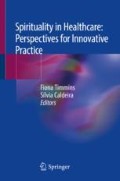Abstract
Mindfulness practises are useful in allowing us a way to connect with ourselves, while developing an awareness of our physical self which can be a useful way of telling us what is going on in our life. Mindfulness can also enable us to be more connected with people around us and the environment in which we find ourselves.
The mindfulness and compassion practices presented will allow us to develop awareness, which will facilitate us to notice our experiences, patterns and habits. This increased awareness allows us to make choices of where we can focus our attention. The ability to stand back and see situations from a different perspective gives us the chance to choose how we react or respond to situations. It also gives us space to realise that we may be contributing to our distress and discomfort by how we react to situations.
The body may be used as an anchor for our mindfulness practice, for example, using the breath or soles of the feet while walking. The availability of these tools can help facilitate a daily mindfulness practice which can help lower stress and enhance daily living if practiced regularly. Daily meditation can become a ritual like bathing or brushing our teeth. Mindfulness can allow us to feel a greater connection with ourselves and with experiences in our bodies and our minds.
These mindfulness practices can be carried out with an attitude of kindness and gentleness which can bring us peace and clarity when we are in difficult situations and in relationships with others. These tools may also enable us to enhance our joy, compassion, peace, gratitude and forgiveness.
Neuroscientists have published thousands of papers over the last two decades showing the benefits of mindfulness and compassion practises. They have described how positive epigenetic and brain changes can happen even after eight hours of mindful loving-kindness training.
Access this chapter
Tax calculation will be finalised at checkout
Purchases are for personal use only
References
Wax R. How to be human; the manual. London: Penguin Life; 2018.
Kabat-Zinn J. Full catastrophe living: how to cope with stress, pain and illness using mindfulness meditation. London: Piatkus; 2013.
Nhat Hanh T. The miracle of mindfulness. New York: Beacon press; 1975.
Ricard M. The art of meditation. London: Atlantic Books; 2010.
Chah A. It’s like this. London: Amaravati Publications; 2013.
De Mello A. Awareness. New York: Crown Publishers; 1987.
Lutz J, Herwig U, Opialla S, Hittmeyer A, Jäncke L, Rufer M, Martin M, Holtforth G, Brühl A. Mindfulness and emotion regulation—an fMRI study. Soc Cogn Affect Neurosci. 2014;9(6):776–85. https://doi.org/10.1093/scan/nst043.
Amaro A. Finding the missing peace. London: Amaravati Publications; 2012.
Silverstone S. The mindfulness breakthrough. London: Watkins; 2012.
Hasenkamp W, Barsalou WB. Effects of meditation experience on functional connectivity of distributed brain networks. Front Hum Neurosci. 2012;6:38.
Goleman T. Emotional alchemy: how the mind can heal the heart. New York: Harmony Books; 2001.
Hughes L. The art of allowing the breath in meditation and in life. Dublin: Columba; 2010.
Germer C. The mindful path to self compassion freeing yourself from destructive thoughts and emotions. New York: Guilford; 2009.
Williams M, Teasdale J, Segal ZV, Kabat-Zinn J. The Mindful way through depression: freeing yourself from chronic unhappiness. New York: Guilford; 2007.
Segal ZV, Williams M, Teasdale J. Mindfulness-based cognitive therapy for depression second edition. London: Guilford Press; 2018.
Crane R. Mindfulness based cognitive therapy. New York: Routledge; 2009.
Kozasa EH, Tanaka L, Monson C, Stephen Little S, Leao FC, Peres M. The effects of meditation-based interventions on the treatment of fibromyalgia. Curr Pain Headache Rep. 2012;16(5):383–7.
Bohlmeijer E, Prenger R, Taal E, Cuijpers P. The effects of mindfulness-based stress reduction therapy on mental health of adults with a chronic medical disease: a meta-analysis. J Psychosom Res. 2010;68(6):539–44. https://doi.org/10.1016/j.jpsychores.2009.10.005.
Chiesa A, Serretti A. Mindfulness based cognitive therapy for psychiatric disorders: a systematic review and meta-analysis. Psychiatry Res. 2011;187(3):441–53. https://doi.org/10.1016/j.psychres.2010.08.011.
Desbordes G, Negi LT, Pace TWW, Wallace BA, Raison CL, Schwartz EL. Effects of mindful-attention and compassion mediation training on amygdala response to emotional stimuli in an ordinary, non-meditative state. Front Hum Neurosci. 2012;6:Article ID 292.
Paginini F, Bercovitz K, Langer E. Perceived control and mindfulness: implications for clinical practice. J Psychother Integr. 2016;26(2):91–102.
Neff K. Self-compassion: the proven power of being kind to yourself. New York: Harper Collins; 2011.
Halifax J. The precious necessity of compassion. J Pain Symptom Manage. 2010;41(1):146–53.
Gilbert P, Choden M. Mindful compassion. London: Constable Robinson; 2013.
Gilbert P. Compassion: concepts, research and applications. London: Routledge; 2017.
Van den Brink E, Koster F. Mindfulness based compassionate living. New York: Routledge; 2015.
Chodon M. Start where you are: a guide to compassionate living. Boston: Shambhala Publications; 2001.
Hanson R. Hardwiring happiness. London: Rider; 2013.
Adams CE, Leary MR. Promoting self-compassionate attitudes toward eating among restrictive and guilty eaters. J Soc Clin Psychol. 2007;26:1120–44.
Berry KA, Kowalski KC, Ferguson LJ, McHugh TF. An empirical phenomenology of young adult women exercisers body self-compassion. Qual Res Sport Exerc. 2011;2:293–312.
MacBeth A, Gumley A. Exploring compassion: a meta-analysis of the association between self-compassion and psychopathology. Clin Psychol Rev. 2012;32:545–52.
Heffernan M, Griffin M, McNulty S, Fitzpatrick JJ. Self-compassion and emotional intelligence in nurses. Int J Nurs Pract. 2010;16:366–73.
Neff KD, Rude SS, Kirkpatrick K. An examination of self-compassion in relation to positive psychological functioning and personality traits. J Res Pers. 2007;41:908–16.
Neff K, Germer C. The mindful self compassion workbook: a proven way to accept yourself build inner strength and strive. New York: Guilford; 2018.
Author information
Authors and Affiliations
Corresponding author
Editor information
Editors and Affiliations
Rights and permissions
Copyright information
© 2019 Springer Nature Switzerland AG
About this chapter
Cite this chapter
Neenan, K. (2019). Being Human: Cultivating Mindfulness and Compassion for Daily Living. In: Timmins, F., Caldeira, S. (eds) Spirituality in Healthcare: Perspectives for Innovative Practice. Springer, Cham. https://doi.org/10.1007/978-3-030-04420-6_13
Download citation
DOI: https://doi.org/10.1007/978-3-030-04420-6_13
Published:
Publisher Name: Springer, Cham
Print ISBN: 978-3-030-04419-0
Online ISBN: 978-3-030-04420-6
eBook Packages: MedicineMedicine (R0)

